A few entrepreneurs in India have begun exploring the uncharted space of manufacturing organic alcohols.
◊ By Bhumika K
Note: To find organic brands and organic products in India, buy the Organic Directory
If fresh organic fruits and vegetables and organic readymade foods have dominated the tables of households in India these past five years, it won’t be long before organic alcohol finds its way regularly to our glasses to pair up with the organic food soon.
While still in a nascent stage, some individuals and companies in India are catching up with the worldwide trend of producing organic wines and alcohols. Organic alcohol is slowly being perceived and accepted the world over for being a healthier, chemical-free and sustainable alternative to regular or conventional alcohol.
Globally, organic beers, wines and whiskey have begun to grab eyeballs due to a shift in consumer mindset towards healthier options. In fact, globally, the food grade alcohol market is expected to reach US$ 8.8 billion by 2027, according to the market research firm, Allied Market Research.
The global organic wine market is estimated to reach US$16,647.8 million by 2027, as per a market research report by The Insight Partners.
Pure & Eco India takes a look at some of the interesting enterprises being built around organic alcohol across India.
CERTIFIED ORGANIC KIWI WINE FROM NORTH EAST INDIA
We all love juicy green kiwi fruits, and are pretty familiar with imported varieties. What many of us don’t know is that there is a treasure of them to be had from Northeast India.
Love for wine and the heart-wrenching sight of excess produce of delicious kiwi fruits going to waste prompted agricultural engineer, Tage Rita, of Arunachal Pradesh to start her own winery.
The winery is located in Ziro Valley of Lower Subansiri District in Arunachal Pradesh in a village named Hong. It is an industrial unit and the production is of commercial and industrial scale. It is an area now well-known for growing organic kiwi in India.
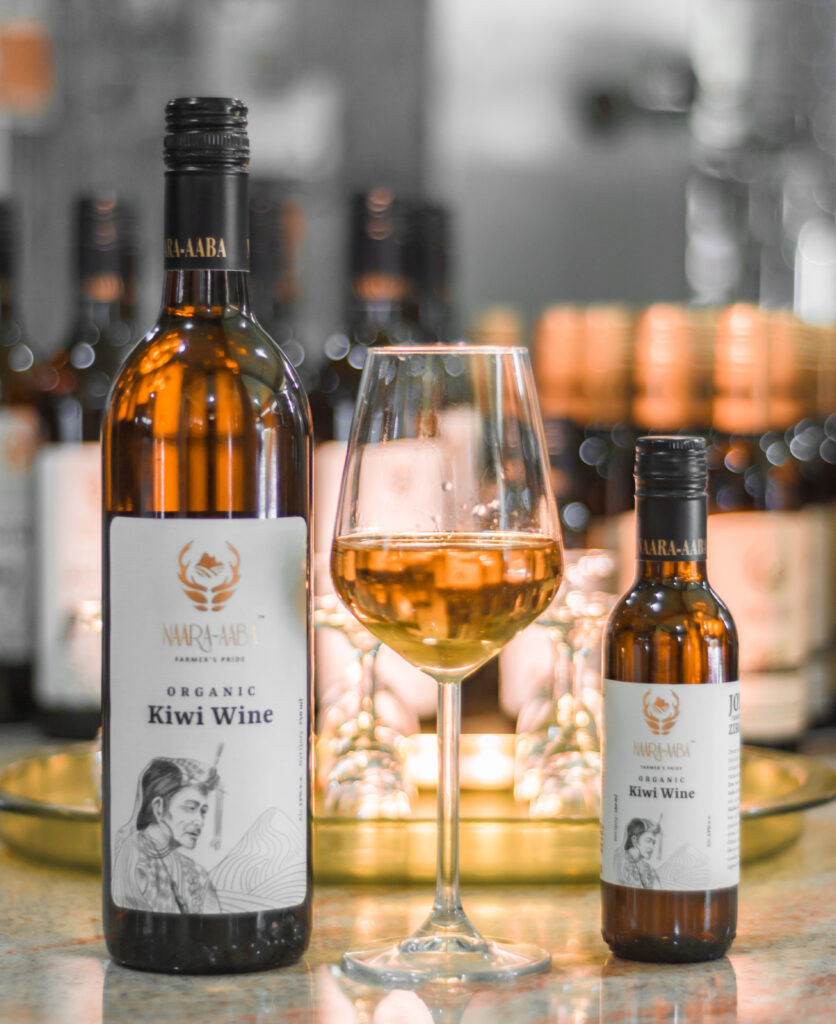
Naara Aaba is India’s first certified organic wine

A love for wine and the heart-wrenching sight of excess organic kiwis going to waste prompted agricultural engineer, Tage Rita, of Arunachal Pradesh to start her own winery
“Kiwi fruits of Ziro are the first certified organic kiwi in the country. I follow organic processing methods in wine making. After three years of rigorous follow ups, training and inspections, my wine brand, ‘Naara Aaba‘, is a certified organic kiwi wine now,” says Rita.
Kiwi is the favourite fruit of her family and Rita says that however much you consume, it doesn’t upset your tummy. “But this divine, delicious and very nutritious fruit was rotting on the ground and being fed to cattle in many households in Ziro Valley. I have seen mountains of kiwi fruit being dumped in streams running across kiwi orchards in Ziro Valley, where I live. There were no buyers for this fruit,” recalls Rita.
The wastage of surplus fruit gave her and her husband the idea of starting a winery wherein the fruits could be used up in large quantities. And so, Lambu Subu Food and Beverages Limited, was born. “It was also our love for wines that gave us the get-set-go energy to make wine on our own,” says Rita.
The couple has employed a professional wine master of international repute at the winery to ensure sound processing and quality. The wine is certified by the Pune-based certification agency, NOCA (Natural Organic Certification Agro Pvt Ltd), which is one of the 33 certification bodies in India to have been accredited by APEDA (Agricultural and Processed Food Products Export Development Authority).
Rita buys the fruits from the Kiwi Growers Cooperative Society Ltd Ziro, which comprises approximately 300 farmers. The kiwi fruit is harvested only once a year, during the months of October-November. The production unit provides local employment to 25 regular staff and hundreds of seasonal employees. Every year, there is tremendous increase in cultivation and production, according to Rita.
The plant has the production capacity of 60,000 litres per batch. The wine is sold in 750 ml bottles and is priced at Rs 1,200 per bottle. Naara Aaba wine is available in retail stores across Arunachal Pradesh, Assam and Shillong at present.
There are suitors aplenty outside the North East for her wine. But foremost on Rita’s mind is the expansion and upgradation of the winery – to five times the current capacity in order to meet growing demand. “I want to introduce wine tourism in Ziro Valley, and the state as a whole,” she shares.
Exports, too, are on the anvil. “We have been to a couple of international exhibitions through APEDA and received many interesting leads,” says Rita.
Organic wine from many other organic fruits like plums, pears, peaches and wild apples has also started, although it’s in the initial stages currently.
GOA’S HERITAGE LIQUORS – URAK & FENI
Travelling from the North East of the country to the Western Ghats region, you will encounter another interesting tipple. The Malkarnekars’ 50-acre organic farm-cum-farmstay in Goa is a romantic and idyllic setting for the creation of two very potent drinks – Urak and Feni derived from organic cashew fruit.
The drinks are distilled from the cashew apple or fruit (what we consume are the nuts). At the Malkarnekars’ 37-year-old plantation in Karmane village—Dudhsagar Plantation—organic cashew is grown semi-wild on the hillocks to maintain biodiversity of the area.
Although the farm has refrained from pursuing organic certification, it has long established (since its origin in 1984) its repute as a purely organic cultivator.
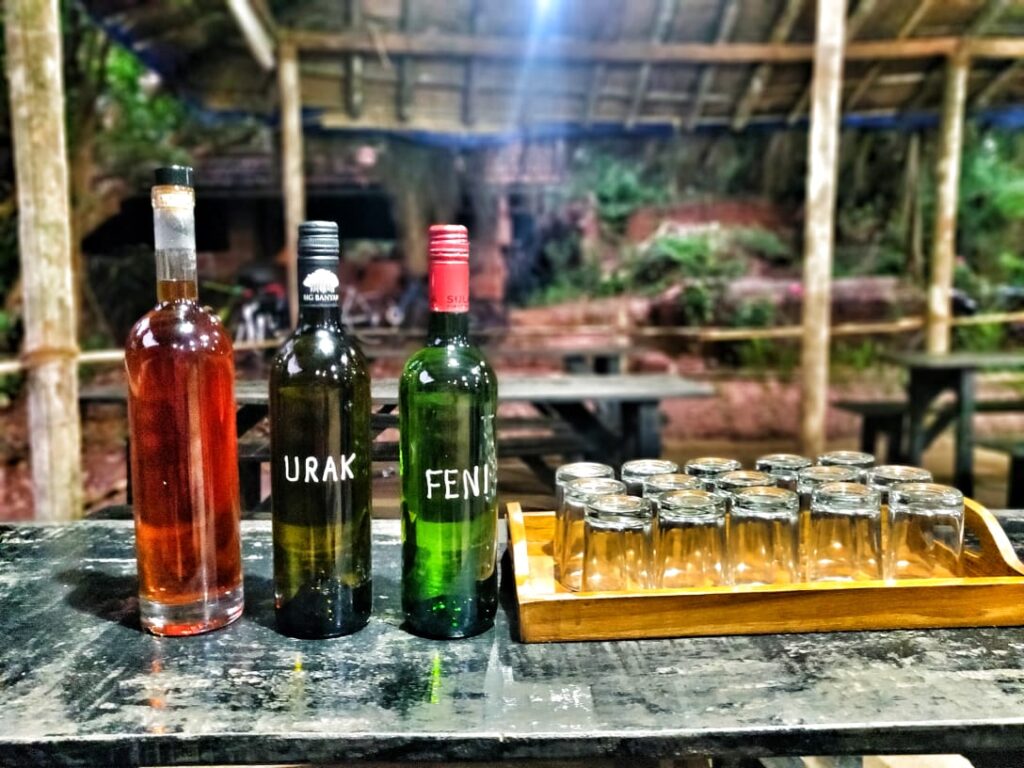
The Malkarnekars’ 50-acre organic farm-cum-farmstay in Goa is a romantic and idyllic setting for the creation of two very potent drinks – Urak and Feni derived from organic cashew fruit
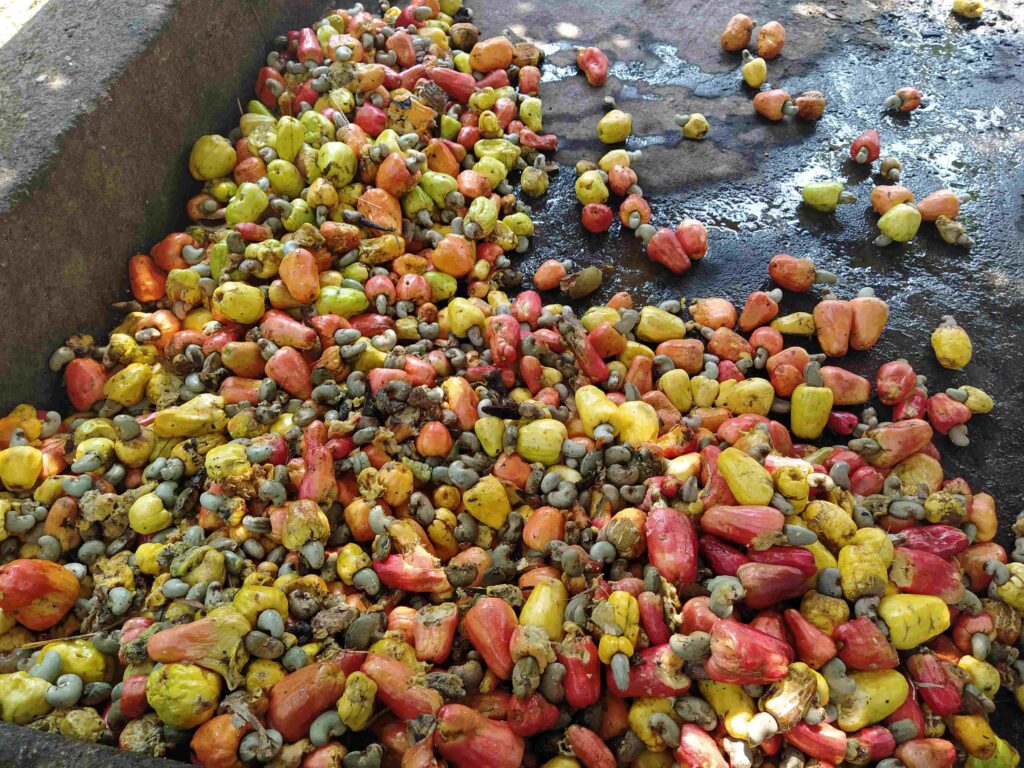
Freshly picked organic cashew fruits (with nuts)
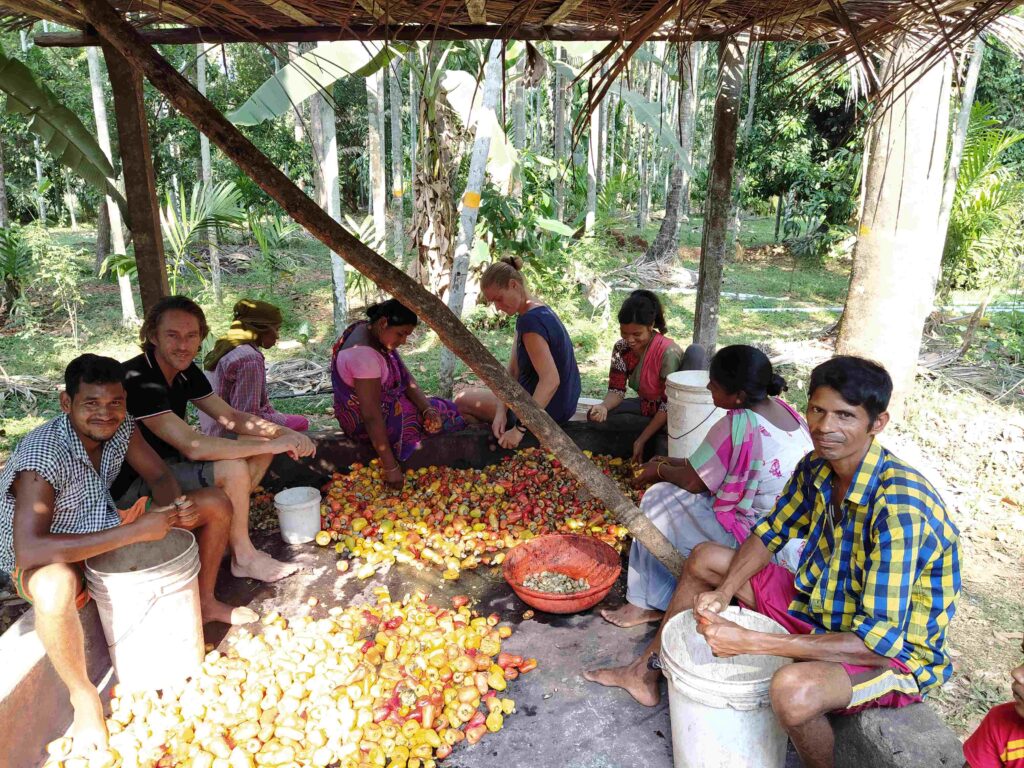
Farm workers and guests at the farm separate cashew nuts from the fruit. Urak and Feni are distilled from the cashew apple or fruit (what we consume are the nuts, not the fruit)
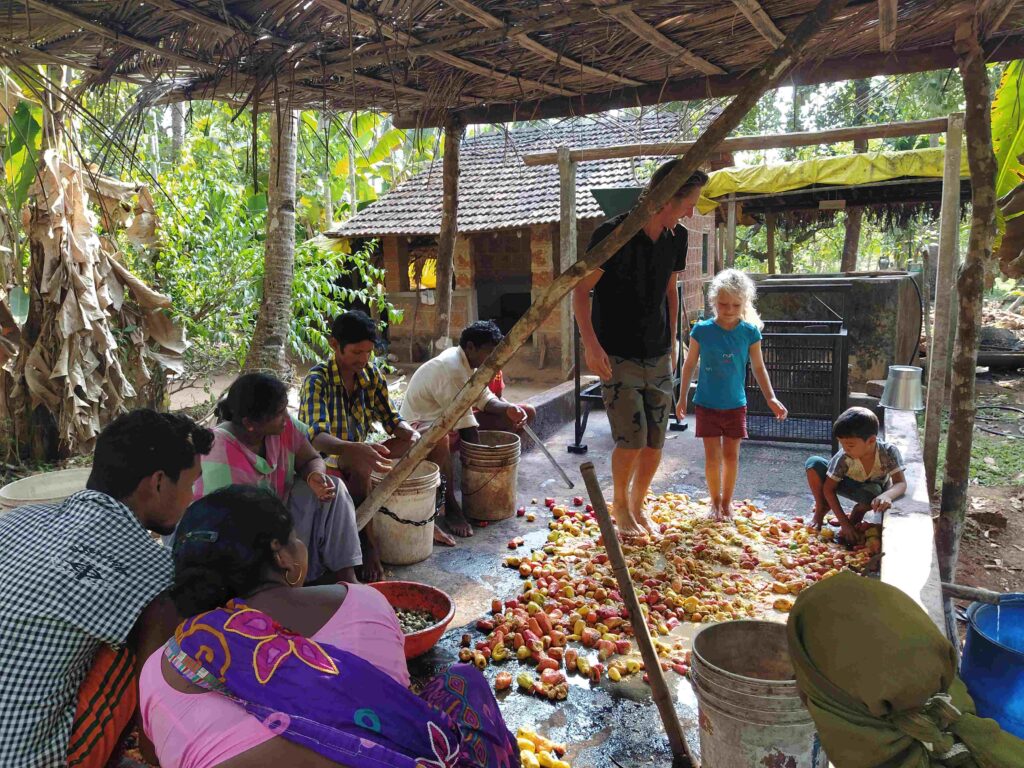
After separation from the nuts, the cashew fruit is then stomped on, much like in the process of grape wine-making
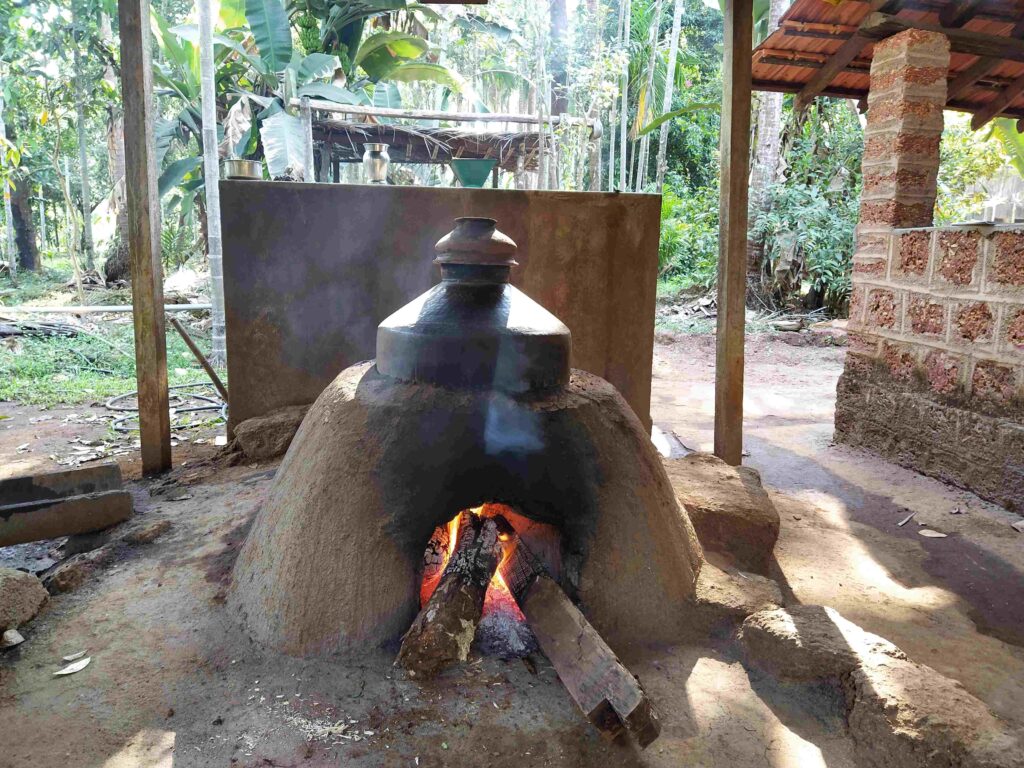
Dudhsagar Plantation’s inhouse distillery – a traditional wood-fired still for distillation of Uraak and Feni
To maintain high quality of liquor, only very ripe cashew apples are collected—these are the ones that drop down in the afternoon breeze! Workers then manually twist out and separate the nut or seed from the apple. The fruit for the alcohol is then stomped on, much like in the process of grape wine making.
No sugars or yeast are added and the alcohol ferments naturally after this. The drink is then distilled in wood-fired copper pots. The first distillate is called Urak, which is lighter and contains about 35 to 45% alcohol, and has a fruity aroma. The second distillate is Feni – and this is artisanal handmade Feni – so the alcohol content is 50 to 55% as opposed to the 43% alcohol content in commercial Feni.
“A real Feni drinker wants it to be crisp. It also has medicinal uses; it’s even used to massage aching joints. “Fen” means ‘foam’ or ‘bubbles’. When you shake a bottle of Feni, froth is formed – an easy way of distinguishing Feni from Urak without opening a bottle,” shares Ashok Malkarnekar, Partner, Dudhsagar Plantation.
It takes about four hours to distill about 15 litres of Feni. “My father, Ajit Malkarnekar, is a master distiller and I have learnt this whole process from him,” says Ashok.
They sell the drinks in 750 ml bottles (they use recycled glass wine bottles to keep it eco-friendly). The Urak is priced at Rs 400 and the Feni at Rs 600 per bottle. They don’t have a bottling license yet so the drink is not branded. They sell about 800 litres of Urak and Feni combined per season. Cans of 5 or 10 litres are also sold.
The Malkarnekars have an annual production capacity of 1,200 litres of both Urak and Feni put together.
The cashew is a seasonal plant and is harvested from March to May. Currently, the Malkarnekars use cashew from their own plantation, but are considering procuring cashew from neighbouring farms with a view to scale up production soon. Excise Department rules prevent them from procuring from outside their zone.
Their organic feni and organic urak are sold locally – at local bars, to guests at their farmstay who take it back as a souvenir, and to friends. “Cashew Feni is classified as heritage liquor by the Excise department. It’s got the Geographical Indication or GI tag. It is still considered country liquor and, therefore, there are sale issues outside the state. But the Goa government is creating awareness about it,” says Ashok.
CERTIFIED ORGANIC ALCOHOL AS RAW MATERIAL FOR INDUSTRIES
While most alcoholic products are in the consumer and retail space, there is another interesting area that remains unexplored in the country. Organic alcohol is in demand in various allied industries in India, especially pharmaceutical and cosmetics. Next, we move to Maharashtra to learn about ENA (Extra Neutral Alcohol), the primary raw material for making alcoholic beverages.
A byproduct in the production of sugar is molasses, which forms the base for manufacture of alcohol. Girish Kumbhar, Director, Corelife Wholefoods Private Limited, Pune, explains his company has tied up with a leading sugar manufacturing group, which also owns a large distillery located in Solapur. Corelife supplies the raw material – organic sugarcane – and the distillery produces the organic alcohol from the organic molasses obtained during the production of organic sugar. The end product is ENA, which is a colourless food-grade alcohol, neutral in smell and taste, and usually with over 95% alcohol by volume.
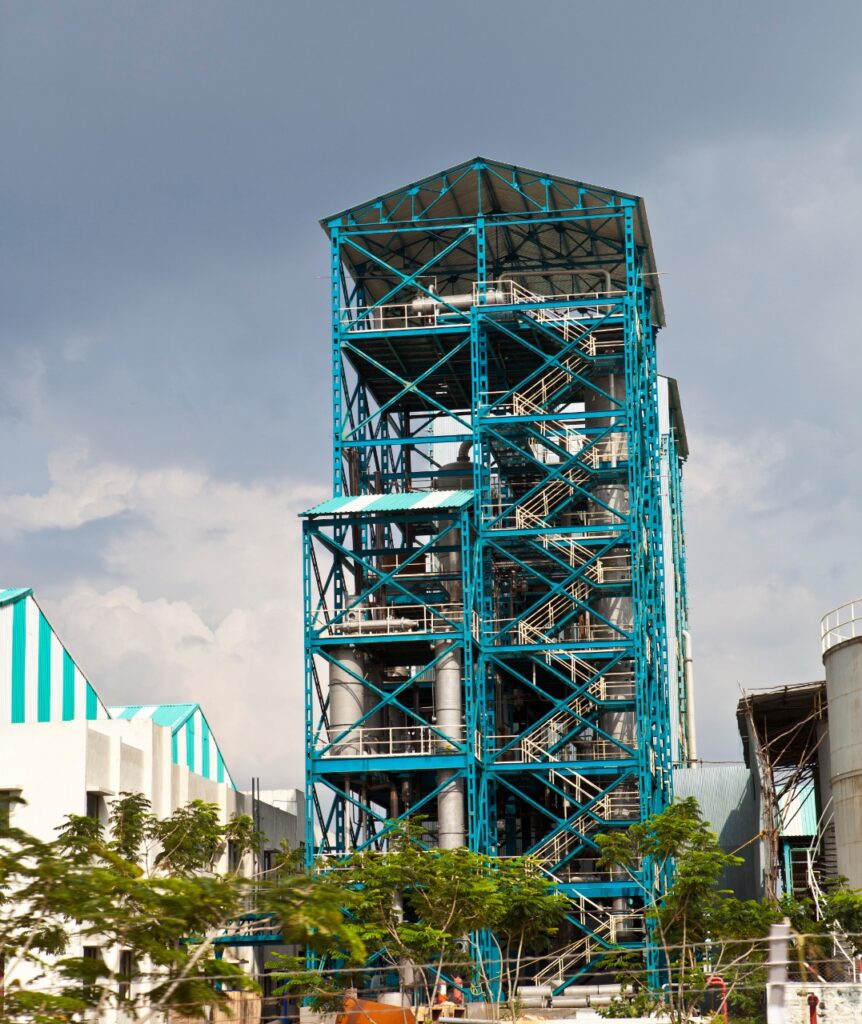
The Solapur-based distillery, which produces organic ENA (Extra Neutral Alcohol)
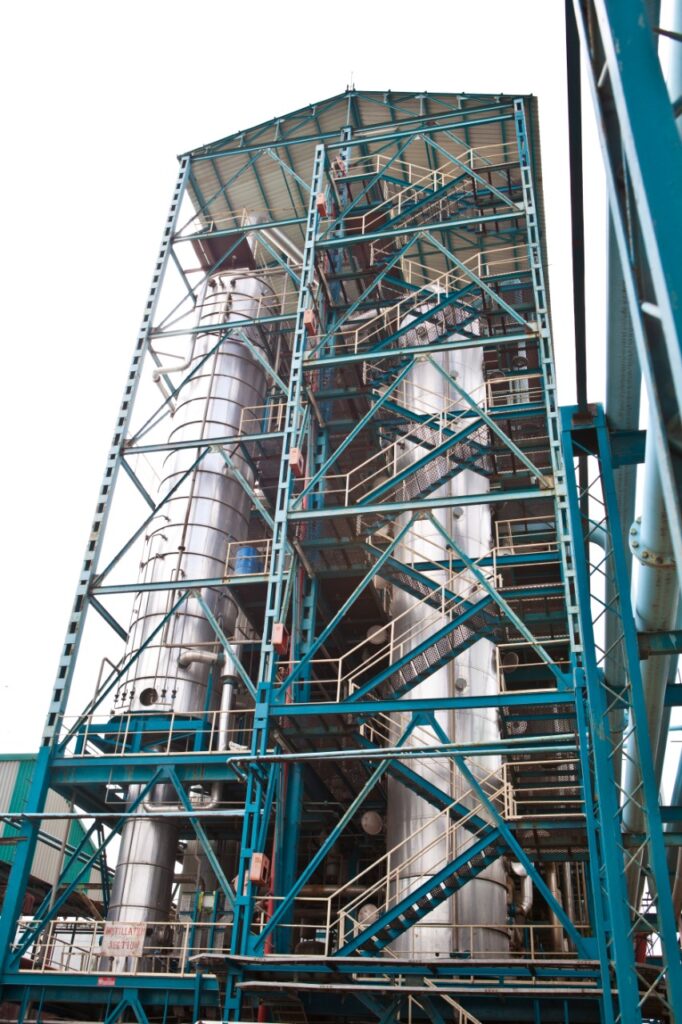
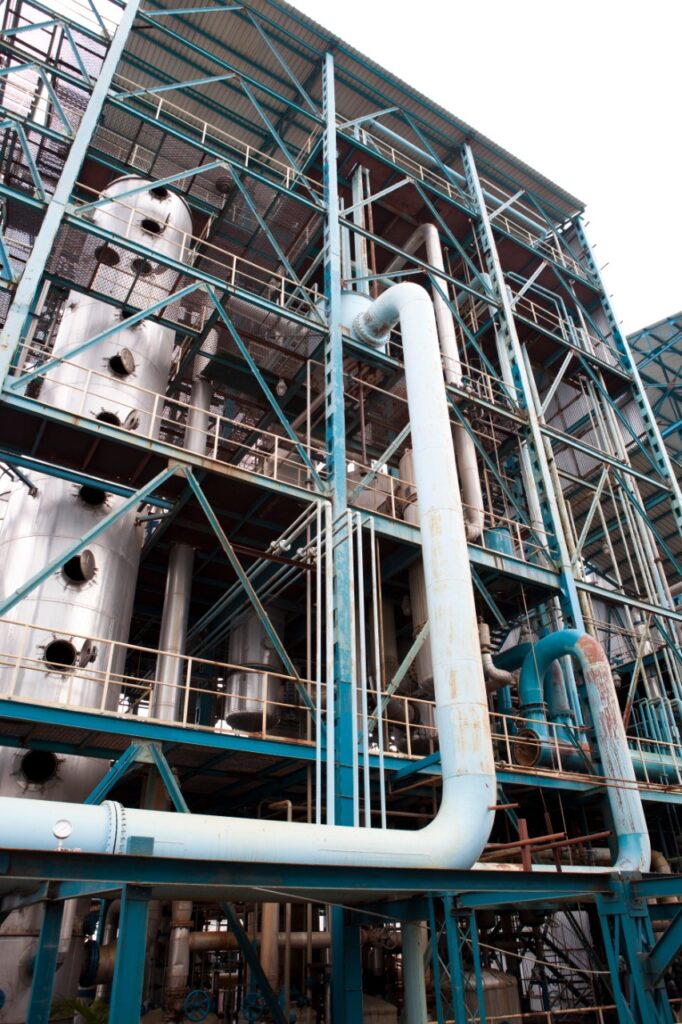
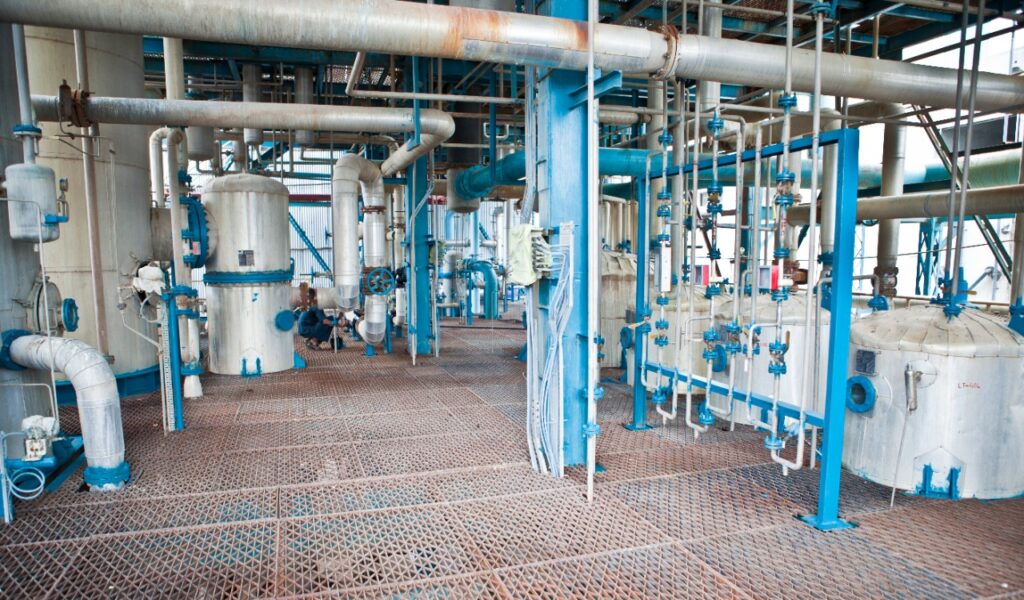
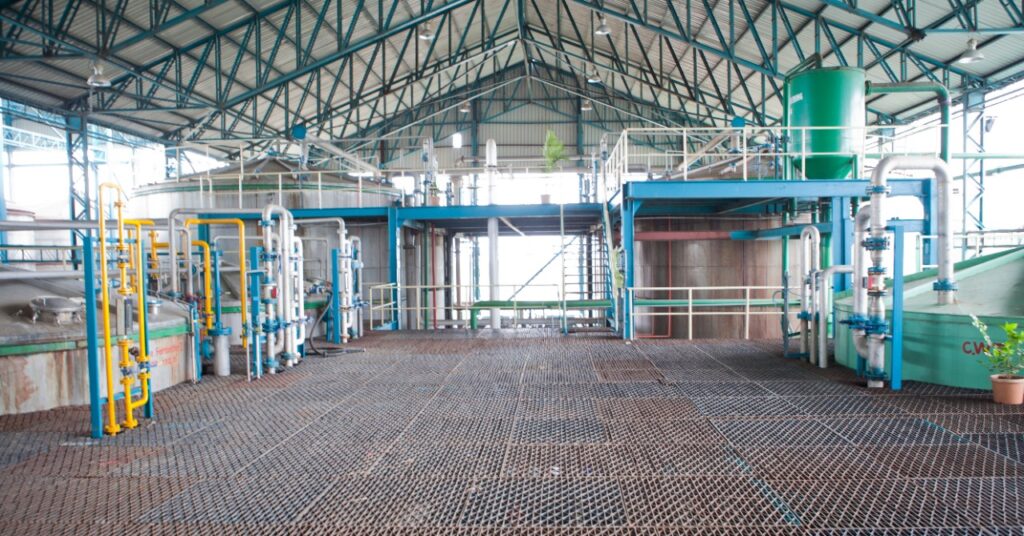
“We are leading organic sugar exporters and our organic sugar is exported to USA, Europe, Canada, Australia, Korea, etc,” says Kumbhar, whose company also promotes the organic food brand (domestic retail and export), Mangal Organics.
Corelife has a large network of farmers whose fields are certified as organic. “We crush organic sugarcane to obtain juice. The juice is further processed without using any chemicals to produce organic sugar. During this process, organic cane molasses is the byproduct generated. Molasses play a vital role in manufacturing of organic alcohol. It is possible to remove desired impurities from rectified spirit to get high quality ENA, which is NPOP (National Programme for Organic Production)-certified by the certification agency, OneCert. We supply our ENA to liquor industries, pharma industries and cosmetics industries. It is majorly used as a premium solvent in specialised high-quality extraction processes. The companies which use our organic alcohol export their final products to USA and Europe,” Kumbhar elaborates.

“Our organic alcohol is NPOP-certified, the first in India to have received organic certification. We supply our organic ENA to liquor industries, pharma industries and cosmetics industries. It is majorly used as a premium solvent in specialised high-quality extraction processes. The companies which use our organic alcohol export their final products to USA and Europe.” – GIRISH KUMBHAR, Director, Corelife Wholefoods Private Limited
Corelife have been producing organic alcohol since 2019. Currently, it is the only manufacturer of NPOP-certified organic alcohol in India.
“We have a significant production capacity of 80 KL or kilolitres, but we produce the alcohol on demand as per required specifications. The organic alcohol is either sold in bulk tankers of 24 KL to 40 KL or in HDPE drums of 250 to 280 litres. We also produce ENA as per the required standards of our customers,” says Kumbhar.
By 2022, the company expects to sell upwards of 1,000 KL of organic alcohol per year.
ORGANIC CERTIFICATION FOR LIQUOR IN INDIA
Like with any organic food or beverage, there’s an element of quality assurance if alcohol claiming to be organic is certified as such. Certification for organic alcohol is available in India.
Upendra K. Vats, General Manager, APEDA, says “Organic wines can be certified if the requirements for food processing of NPOP are followed.”
“The advantages of organic certification are tracking and traceability, an assurance of quality to the customer, and the ability to export,” says Narayana Upadhyaya, MD of Bengaluru-based Aditi Organic Certifications Pvt Ltd, another accredited certification body in the country.
“Organic alcohols will surely be sought after by those who are health conscious and environment conscious – those who want to ensure their drink is free from harmful chemicals, and those who believe that in the long run, organic products will help in soil and water conservation. We have had enquiries for certification from makers of organic drinks made from jackfruit and cashew fruit. But it’s all in the initial stages,” says Upadhyaya.
This nascent development in the organic alcohol space could mature into India vying for a slice of that USD 8.8 billion organic alcohol market pie in the future.


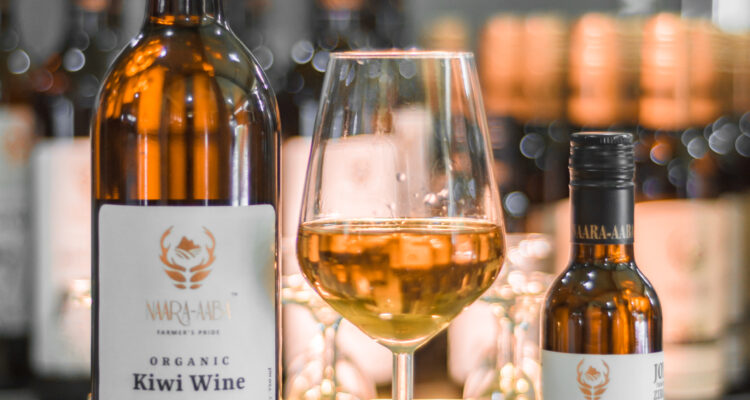
Great work,
If you want organic millet for this process, please contact us,we grow pure organic grain in Uttrakhand.
எனக்கு மருத்துவபயனுக்காக ஆர்கானிக் பிராந்தி தேவை படுகிறது.இதை பயன்படுத்தலாமா? விலை எவ்வளவு?
Are making beer